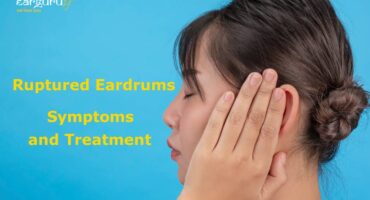There is a very strong possibility that most of us will suffer from Hearing Loss at some stage in life. Some get it late but a majority of us get affected early.
There are 3 types of Hearing loss but 90% of the people suffer from Sensorineural hearing loss. Let us get familiar with the symptoms, causes and remedies so we are better prepared to face it.
Table of Contents
- What is Sensorineural Hearing Loss?
- What are the Symptoms of Sensorineural Hearing Loss?
- 9 Sensorineural Hearing Loss Symptoms
- The 7 Main Causes of Sensorineural Deafness
- The Cure for Sensorineural Hearing Loss
- Remedies for Sensorineural Hearing Loss
What is Sensorineural Hearing Loss?
Sensorineural Hearing Loss (SNHL) is also known as Nerve Loss or Sensorineural Deafness. It is the Hearing loss which is due to nerve damage or reduced sensitivity of the Sensory and the neural parts of the human ear. If the loss is in both ears it is known as Bilateral Sensorineural Hearing Loss. There are some cases of Sudden Hearing Loss or Sudden Sensorineural hearing loss or sudden neurosensory hearing loss.
How Does Sound Travel Through The Ear?
The Hair Cells in the Cochlea convert the sound waves into electrical signals. Let us understand a little about how sound travels from the Outer Ear to the Inner Ear.
The animated video will help us understand the Journey of sound from the Outer ear to the Inner Ear and to the Brain.
What are the Symptoms of Sensorineural Hearing Loss?
We should be aware of the subtle symptoms and signs of Sensorineural Hearing loss. The Hearing loss is not very obvious as it starts gradually. An early detection and timely visit to the ENT Doctor will help in slowing down the advancing loss.
9 Sensorineural Hearing Loss Symptoms
Difficulty in following the Conversation
It normally starts with difficulty in following conversations in a group discussion. One tends to miss out on some words. The problem shows up in a one to one conversation though it is not as obvious as in a group discussion.
Cannot understand Speech in a Noisy Environment
It becomes very difficult to understand others if the conversation is in a noisy environment like a restaurant or at a sports event.
Others are Mumbling or not Speaking Clearly.
We get the feeling that the other person is mumbling and not speaking clearly. This indicates that we are missing speech at certain frequencies.
Requesting Others to Repeat Themselves
We repeatedly request others to repeat themselves. It’s an indicator that we are missing out certain words in the conversation.
Increasing the Volume while Watching Television
Increasing the volume setting on the Television or Music system higher than the earlier settings. Listening to Television or Radio is more difficult than listening to another person speaking,
Difficulty in Speaking on the Phone
It is difficult to follow a coneversation on the phone. The limited frequency range of the phone reduces our ability to hear certain words.
Need to look at the Speaker to Follow the Conversation
We need to keep looking at the person who is speaking to follow the conversation. We subconsciously lip read to help us understand the parts of the conversation missed due to Hearing loss.
Exhausted after a Lengthy Conversation
Our Brain is working hard to fill in the missing words and make sense of the conversation. We end up paying more attention to simple tasks like having a normal discussion. This increases the stress factor and results in exhaustion and fatigue.
Avoiding Social Functions
Once we realise that conversing is difficult, we tend to avoid attending Social functions. We avoid group gatherings as we fear we may end up embarrassing ourselves by not understanding the discussion.
Causes of Sensorineural Deafness
Sensorineural deafness is due to the inability of the delicate Hair Cells to convert the vibrations into electrical signals. Another reason could be the inability of the Auditory Nerve to carry the signal to the brain.
This video will help us understand SNHL
The 7 Main Causes of Sensorineural Deafness
Ageing or Old Age
Ageing is a natural process of the human body. Our body along with our organs of sense too grow old and do not perform at their best. The Hair cells in the Ear and the nerves become less efficient resulting in Sensorineural deafness.
Exposure to Loud Sounds
Constant exposure to loud sound results in permanent damage to the Hair Cells. The noise exposure could be due to Traffic Noise, working in a workshop or listening to loud music. Take precautions to protect our ears from loud sounds. Use available Ear Protection Devices.
Physical Injury
In case of an accident, a physical hit to the Ear or the part of the Ear near the Cochlea or the nerves can cause permanent damage. This damage may result in Sensorineural deafness.
Infections and Diseases
Viral Infections like measles, Mumps, Meniere’s Disease or High fever. Diseases like Diabetes, High blood pressure also cause Sensorineural Hearing Loss.
Family History of Hearing Loss
In the case of a family history of Sensorineural deafness, the chances of the children getting it is high.
Malformation of the Ear
Malformation of the Inner Ear during birth or a genetic disorder causes Sensorineural Hearing Loss.
Ototoxicity due to Medicines
Some medicines if taken in large doses affect the delicate Hair cells in the Cochlea. It is advisable to consult your Doctor and avoid self-medication. Over the counter medicines like Aspirin if taken in large does can cause Sensorineural deafness.
The Cure for Sensorineural Hearing Loss
There are no medicines or surgical procedures to cure sensorineural Hearing Loss. Pharma Companies and a few start-ups dedicated to solving this problem are very close to a solution. Research in Gene Therapy and Stem Cell Technology is also at an advanced stage to provide solutions. The day is not far when Sensorineural deafness treatment will be as simple as popping a pill.
Remedies for Sensorineural Hearing Loss
Hearing Aids are the common remedy for Sensorineural Hearing Loss. Digital Hearing aids are software programmable and tuned as per the Hearing Loss of the user. The different styles of Hearing aids are available to suit the users need and lifestyle.
Cochlear Implants is also an option. This option is not very common as it involves a surgery. The Cochlear Implant surgery is for candidates who meet a certain medical criterion. The electrodes of the implant are surgically implanted in the Cochlea. The electrodes of the Implant provide the electrical impulses. In a normal Ear, the hair Cells provide the electrical impulses.
Sensorineural deafness is the most common of all Hearing Losses. Protecting our Ears from high levels of sound will delay the onset of Hearing Loss. Developing Healthy Hearing Habits leads to a Healthy life.
Read our blog on What is Hearing Loss? All FAQs Answered for all your queries on the topic of hearing loss.




Great piece of writing with immensely informative contents! I really liked the writing style and the whole process of the story building. Waiting for more posts! Cheers!!
My Auditory Nerves are damaged. Myelin Sheath has lesions. CIs wouldn’t work for this condition. Another procedure, a brain stem implant might. I’m hoping stem cell treatment will be effective. They are currently being done in China and Mexico with some reports of recovered hearing. However, no insurance coverage and prohibited costs